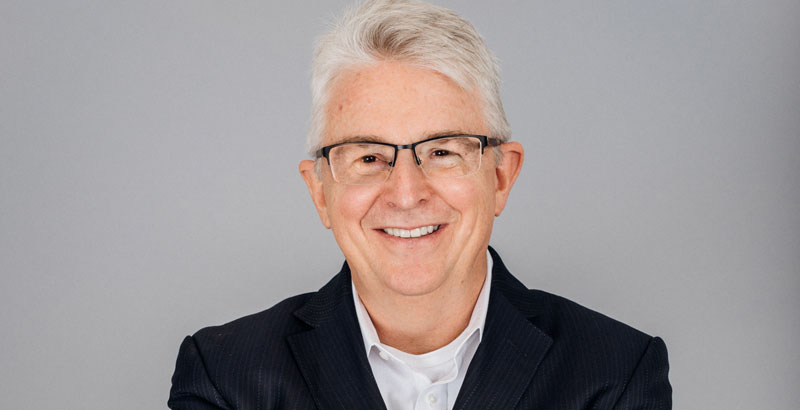Top DeVos Deputy Tells Nation’s Education Reporters That Pandemic Adds Urgency to Federal Push for Private School Choice

If anything, the global pandemic has deepened U.S. Secretary of Education Betsy DeVos’s commitment to all forms of school choice, top deputy Jim Blew told reporters in a keynote question-and-answer session at the Education Writers Association’s 73rd National Seminar, held remotely last week.
The U.S. Department of Education’s assistant secretary for planning, evaluation and policy development, Blew defended DeVos’s desire to create a national tax-credit private school scholarship program, requiring schools that want federal relief funds to offer in-person classes in the coming academic year and to share that aid with private schools and parents opting out of traditional schools.
“We’re not backing off from the need to empower families and classroom teachers with choices,” Blew said. “If anything, COVID-19 underscores the importance of having choice.”
The department agrees that there are substantial costs associated with reopening schools and would support a new congressional appropriation, he said, but called on reporters to cover DeVos’s threats to withhold funding from schools that will operate online only with more “balance.”
“We believe that the local authorities, with health authorities, need to make the decisions about what happens in their schools,” Blew said. “We just wanted to even out the debate a little bit to let everyone know children are better off in school. They’re far better off in school, and there won’t be money coming from the federal taxpayer to support it unless they open.”
Parents and teachers can decide not to return to schools in person, he said. Families that don’t want to send their children back should be sent relief funds directly so “they could work out a different alternative for their own student.”
The red-hot national debate about school reopening is politicized, Blew acknowledged, saying, “There’s not much nuance allowed in presidential rhetoric,” and he called on reporters to provide context.
“There’s two levels of analysis that we have to make here, and one is really about the presidential debate, the campaign rhetoric, the stuff that you all are aware of,” he said. “There’s another set of questions around how it actually gets done. … The president, and I should say Joe Biden, won’t talk about the nuances underneath this larger issue, but as reporters, you should cover it, and those of us who have to implement it really need to understand it.”
It is traditional for federal education secretaries to address EWA’s annual convening. DeVos declined the group’s invitation during her first two years in office, last year sitting for an interview with the New York Times’ Erica Green.
As first moderator Steve Drummond, the executive producer who oversees NPR’s education coverage, and then EWA members questioned Blew, the Q&A grew tense. After rejecting Drummond’s assertion that charter schools in Detroit, a city where DeVos pushed for unimpeded choice in the two decades before her appointment to the Trump administration, underperformed compared with their district counterparts, Blew chastised reporters.
“I understand there is a lot of underperformance throughout Michigan in their schools, and I’m fascinated that reporters want to lay that at the feet of the secretary of education,” he said. “There is a whole line of governors, there are mayors, there are school boards, there are school districts who’ve had real power over how that education system is managed, and somehow or other, a philanthropist, who was encouraging schools to get better, gets blamed for what’s happened in that state.”
Blew went on to describe reporters attending the session as “among the elites in our country” who do not understand that parents in low-income communities can’t work when schools don’t provide an in-person option.
Idaho Statesman investigative reporter Nicole Foy was among attendees who were quick to push back: “I’m not sure if the assistant secretary is aware of the average salary of a local reporter, but in no way are we among the elite.”
Blew apologized, but in the next breath he suggested that teachers are highly compensated. “I have lots of friends who are reporters, and I understand the salary pressures on all of you right now,” he said. “I would, by the way, contrast that with the average salary of a teacher in this country.”
Appearing this year in DeVos’s stead, Blew opened the session by contrasting his and Devos’s “education reform vision” with what he called “the dominant vision … embodied by the labor union that represents teachers in collective bargaining.
“I call it the broken status quo vision,” he continued, “the factory model system that has been in place for about a century.”
School choice is the antidote, Blew reiterated throughout his appearance, emphasizing that he and DeVos believe that the public support their determination to include taxpayer support for private schools and other non-public options.
“We do want them all to reopen, so we have to treat them all evenly,” he said. “We cannot say we’re only going to support the traditional public schools that are unionized.”
In response to questions about school accountability and some states’ desire to suspend annual standardized student assessments, Blew said that without the new school year underway, it’s premature to decide whether to suspend the Every Student Succeeds Act’s testing mandate.
“Let’s see how things evolve,” he said. “But everyone on this call should understand our instinct would not be to give those waivers.”
Get stories like these delivered straight to your inbox. Sign up for The 74 Newsletter

;)
